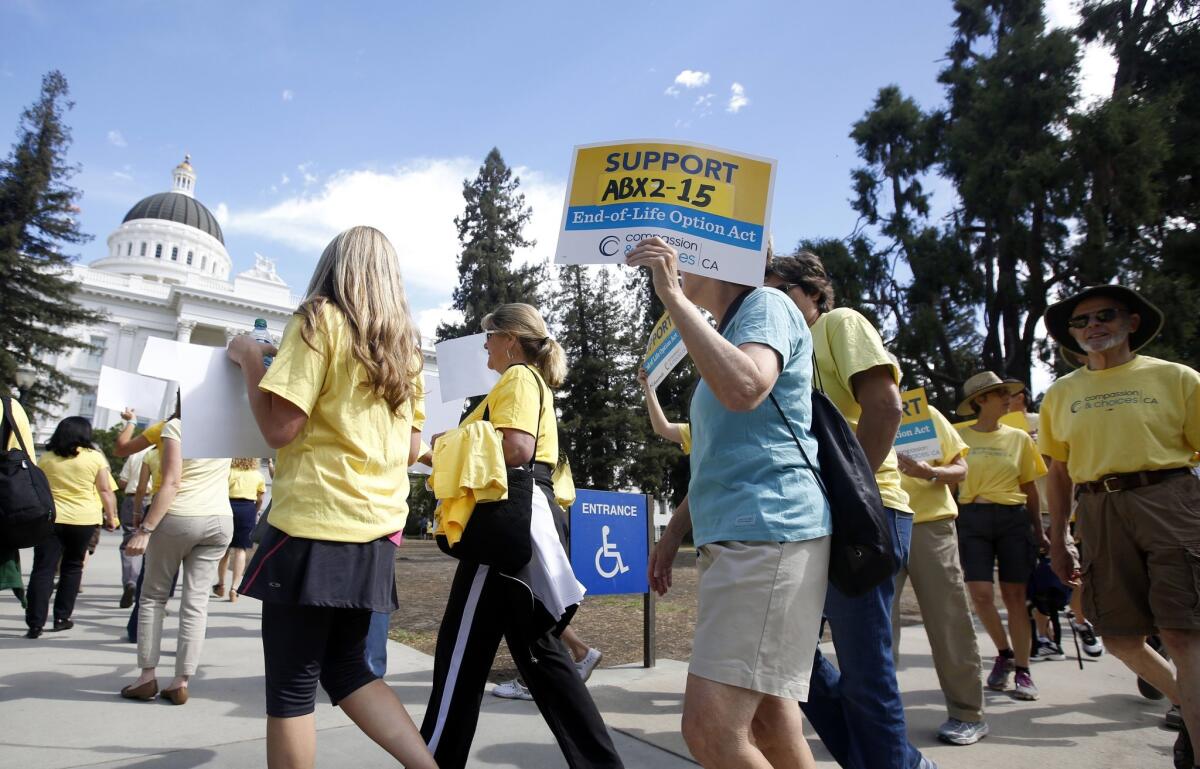Editorial: Opponents fail to derail the state’s right-to-die measure, but they may yet try again in court

Marchers outside the Capitol in Sacramento call on Gov. Jerry Brown to sign a bill allowing the terminally ill to end their own life, on Sept. 24, 2015.
California’s historic new right-to-die law, passed and signed during a special legislative session last year, won a further victory this week when its opponents fell far short of gathering the 365,880 signatures needed by Monday to put a referendum on the November ballot overturning it. That’s good news, because it was a bit of a miracle that the law was passed at all.
An earlier version of the bill, which allows terminally ill people with a life expectancy of six months or less to obtain a prescription for life-ending medication, had failed to make it out of the Assembly Health Committee during the regular session. It was then resurrected and passed in the special healthcare session in September. It was a window of opportunity that skillful supporters of the bill used to their advantage but which opponents saw as a heavy-handed end-run around the legislative process. In our view, the bill was modest, sensible and important; it deserved to be passed, and it’d be a travesty to derail the law now.
Two decades of experience with Oregon’s landmark Death with Dignity Act suggest that [California’s new right-to-die law] will be used sparingly.
But that’s still possible. The group behind the referendum attempt, known as Seniors Against Suicide, says it is now contemplating a lawsuit to stop the law’s implementation. The law is set to go into effect 90 days after the state Legislature concludes the still-open special session on healthcare.
We respect the law’s opponents, including the Roman Catholic Church and some disability-rights advocates; they waged a passionate battle — both moral and practical — against it. But we don’t share their fears. There is no evidence that a law this narrow would lead uncaring health insurers or family members to coerce sick patients to kill themselves in order to save on medical costs.
To the contrary, two decades of experience with Oregon’s landmark Death with Dignity Act suggests that it will be used sparingly. In the first 17 years, just 1,327 people in Oregon requested a life-ending prescription from a doctor. More than a third of them then chose not to use the prescription.
One who did take the lethal prescription was Brittany Maynard, a young woman with terminal brain cancer who bravely chose to go public about moving from the Bay Area to Oregon in order to control the last, and worst, days of her life. Maynard’s story helped push the right-to-die bill through after two similar attempts in the last decade had gone down to defeat.
If the opponents do sue, we hope they do not prevail. They say they would argue that the law should be declared invalid because the special session wasn’t the appropriate venue for such legislation. But a reading of both the state Constitution and the governor’s proclamation calling the special session makes it clear that any sort of healthcare-related legislation was both appropriate and welcome. And what’s more central to our health than the manner and method in which our lives end?
Follow the Opinion section on Twitter @latimesopinion and Facebook
More to Read
A cure for the common opinion
Get thought-provoking perspectives with our weekly newsletter.
You may occasionally receive promotional content from the Los Angeles Times.






